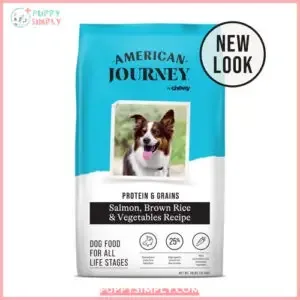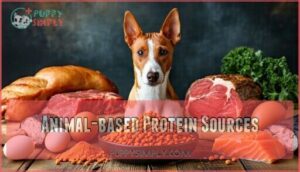This site is supported by our readers. We may earn a commission, at no cost to you, if you purchase through links.

Look for foods with real meat as the first ingredient—chicken, salmon, or lamb work great.
These ancient hounds thrive on 22-25% protein and moderate fat content around 12-15%.
Skip foods with excessive fillers like corn or wheat, as Basenjis can be sensitive to certain grains.
Premium brands like American Journey, Purina Pro Plan, and Blue Buffalo offer excellent nutrition without breaking the bank.
Size matters too—choose kibble that matches their medium build.
The right food keeps your "barkless wonder" healthy, but there’s more to feeding these unique African hunters than meets the eye.
Table Of Contents
- Key Takeaways
- American Journey Salmon Rice Vegetables Dog Food
- Purina Pro Plan Adult Shredded Blend Beef & Rice Formula
- Iams Proactive Health MiniChunks
- Blue Buffalo Life Protection Formula
- The Honest Kitchen Dog Food
- What to Look for When Buying Dog Food for Basenjis
- Can Basenjis Eat a Vegetarian or Vegan Diet?
- How Often Should I Feed My Basenji?
- Is It Necessary to Feed a Breed-specific Dog Food for Basenjis?
- Frequently Asked Questions (FAQs)
- What is the best food to feed a Basenji?
- What is the downside of Basenji?
- Do Basenji have sensitive stomachs?
- How much should I feed my Basenji?
- What health conditions affect Basenji dietary needs?
- Should Basenjis eat raw or cooked food?
- How much water should Basenjis drink daily?
- Can Basenjis eat human food safely?
- What feeding schedule works best for Basenjis?
- Conclusion
Key Takeaways
- Look for 22-25% protein content – You’ll need high-quality animal protein as the first ingredient (chicken, salmon, or lamb) to fuel your Basenji’s athletic build and endless energy
- Choose moderate fat levels around 12-15% – This fat range supports your active dog’s needs without causing weight gain or digestive issues
- Avoid excessive fillers like corn and wheat – Your Basenji can be sensitive to certain grains, so you’ll want to skip foods packed with cheap fillers that don’t add nutritional value
- Feed twice daily with proper portions – You should split your adult Basenji’s 1-2 cups of food into morning and evening meals to maintain steady energy and prevent digestive upset
American Journey Salmon Rice Vegetables Dog Food

American Journey’s salmon-based formula delivers high-quality protein levels your Basenji needs for ideal muscle development.
The salmon benefits include omega-3 fatty acids that promote healthy skin and coat – essential for this breed’s wellbeing.
Rice provides easily digestible carbohydrates without common allergens, though watch for rice allergies in sensitive dogs.
The vegetable content adds antioxidants and fiber for digestive health.
This basenji dog food maintains excellent nutrient balance with real deboned salmon as the first ingredient, making it among the best basenji food options for active dogs seeking premium nutrition.
Purina Pro Plan Adult Shredded Blend Beef & Rice Formula
Anyone seeking premium nutrition for their Basenji will find Purina Pro Plan Adult Shredded Blend Beef & Rice Formula delivers exceptional beef content and reliable adult nutrition. This formula benefits active Basenjis with its dual-texture approach, combining crunchy kibble with tender shredded pieces that enhance palatability.
The rice quality provides easily digestible carbohydrates, while the shredded texture adds variety that keeps mealtimes interesting.
Here are four standout features of this basenji dog food:
- High-quality beef protein supports lean muscle maintenance and energy levels
- Digestible rice formula promotes ideal nutrient absorption and gut health
- Dual-texture blend satisfies different chewing preferences and encourages eating
- Scientifically formulated with veterinary nutritionists to meet AAFCO standards
This best basenji food option combines affordability with proven results. The basenji nutrition profile includes essential amino acids, vitamins, and minerals that support your dog’s overall wellness.
Many owners report improved coat shine and consistent energy levels when incorporating this basenji diet plan into their feeding routine.
Iams Proactive Health MiniChunks
Iams Proactive Health MiniChunks delivers solid basenji nutrition through real chicken as its first ingredient.
This best basenji food contains 26% protein and 15% fat, meeting your dog’s energy needs perfectly.
The MiniChunks benefits include smaller kibble size that’s ideal for breed suitability, making it easier for Basenjis to chew and digest.
Palatability factors shine here – most dogs love the taste.
Cost analysis reveals excellent value compared to premium brands.
The Iams ingredients include wholesome grains and vegetables, supporting your basenji diet plan without breaking the bank.
Blue Buffalo Life Protection Formula
Blue Buffalo Life Protection Formula delivers exceptional protein content through real deboned chicken, supporting your Basenji’s muscle development and energy needs.
This nutrient balance formula addresses life stages with high-quality ingredients that meet feeding guidelines for active breeds. The recipe provides essential amino acids, digestible carbohydrates, and healthy fats your dog needs for peak health.
- Real deboned chicken – Primary protein source for muscle maintenance
- Brown rice and oatmeal – Digestible carbohydrates for sustained energy
- Chicken fat and fish oil – Omega fatty acids for coat and skin health
- Glucosamine and chondroitin – Joint support for active Basenjis
- Antioxidant-rich fruits – Blueberries and cranberries boost immunity
- Natural fiber sources – Sweet potatoes aid digestive health
- AAFCO compliant formula – Meets nutritional standards for all life stages
Basenjis require a diet rich in high protein sources to maintain their energetic lifestyle and support overall health.
The Honest Kitchen Dog Food
Looking beyond conventional kibble, The Honest Kitchen offers minimally processed and human grade dog food that’s particularly well-suited for Basenjis.
Their dehydrated foods use organic ingredients and provide customizable recipes based on your dog’s specific needs.
| Feature | Benefit | Basenji Advantage |
|---|---|---|
| Dehydrated Format | Retains nutrients better than kibble | Supports sensitive digestion |
| Human Grade Quality | Higher safety standards | Reduces allergy risks |
| Customizable Portions | Adjust protein/fat ratios | Manages weight effectively |
| Organic Vegetables | Natural antioxidants | Supports eye health (PRA prevention) |
| No Artificial Preservatives | Cleaner ingredient profile | Minimizes skin irritation |
This Basenji dog food option stands out in dog food reviews for its transparency and quality.
The dog food nutrition profile typically contains 18-24% protein, meeting Basenji requirements without exceeding levels that might contribute to bladder stones.
Many owners appreciate the flexibility to adjust portions based on their dog’s activity level and health needs, making it excellent Basenji nutrition advice for those seeking premium options.
What to Look for When Buying Dog Food for Basenjis
Choosing the right dog food for your Basenji requires understanding their unique nutritional needs and health predispositions.
You’ll want to focus on five key factors: high-quality animal proteins, beneficial fats, digestible carbohydrates, essential nutrients, and avoiding harmful additives that could trigger sensitivities.
Animal-based Protein Sources
When choosing basenji dog food, prioritize whole meats like chicken, beef, or lamb as the first ingredient.
Real meat first – your Basenji’s muscles demand nothing less than premium protein power.
These lean proteins deliver complete amino acid profiles your Basenji needs for muscle maintenance and energy.
Fish sources such as salmon provide omega-3 fatty acids for coat health.
Organ meats offer concentrated nutrition, while meat meals provide protein-dense options.
Egg protein serves as another complete protein source.
Some premium foods include bone broth for added flavor and joint support.
Animal fats complement these proteins, enhancing palatability and nutrient absorption.
Quality meat options guarantee your Basenji receives biologically appropriate nutrition that mirrors their ancestral diet.
It’s vital to review basenji food sources when making a decision.
Healthy Fats and Oils
Healthy fats fuel your Basenji’s boundless energy while supporting everything from joint mobility to that enviable glossy coat.
These athletic dogs require 12-20% fat content in their diet, with omega fats playing starring roles in canine nutrition.
Fish oil delivers EPA and DHA omega-3s that combat inflammation and support brain health.
Coconut oil provides quick energy through medium-chain triglycerides, though moderation matters due to saturated fat content.
Quality dog food fat sources include salmon, chicken fat, and flaxseed oil.
The magic lies in balance—aim for omega-6 to omega-3 ratios between 1:1 and 4:1.
Excessive omega-6 from corn or soy oils triggers inflammation, while proper fatty acids ratios promote ideal health.
Look for named sources like "salmon oil" rather than vague "animal fat" on labels.
These healthy fats enhance palatability, aid vitamin absorption, and address specific Basenji nutrition advice for coat health and joint support throughout your dog’s active life.
Understanding healthy fat sources is vital for making informed decisions about your dog’s diet.
Digestible Carbohydrates and Fiber
Carbohydrate needs for your Basenji go beyond simple energy—they’re the foundation of digestive health and nutrient balance.
Rice and corn deliver exceptional digestibility at over 92%, while whole grains provide steady energy without blood sugar spikes. Quality fiber sources support beneficial gut bacteria and promote healthy stool consistency.
Look for these digestible carbohydrate sources in dog food:
- Brown rice – offers 91.61% digestibility with gentle fiber
- Sweet potatoes – provide beta-carotene and soluble fiber
- Barley – delivers 88.81% digestibility with prebiotics
- Green vegetables – supply micronutrients and insoluble fiber
Premium basenji nutrition advice emphasizes choosing foods with 30-34% carbohydrates from identifiable whole food sources rather than refined fillers. When selecting a diet, consider the importance of proper Basenji dog food to guarantee the best health for your pet.
Essential Vitamins and Minerals
When selecting dog food for your Basenji, vitamins and minerals work like building blocks for ideal health.
These essential nutrients support everything from bone development to immune function.
Key Vitamins Your Basenji Needs:
- Vitamin D – enables calcium absorption for strong bones and prevents developmental issues
- B-complex vitamins – boost energy metabolism and support nervous system function
- Vitamin E – acts as antioxidant protecting cells from oxidative damage
- Vitamin C – strengthens immune defenses and reduces inflammation naturally
Mineral Balance matters tremendously for Basenji dietary needs.
Calcium Needs must align with phosphorus ratios to prevent skeletal problems.
Iron Supplements aren’t typically necessary if dog food nutrients include quality meat sources providing natural iron.
Omega Fatty acids from fish oil support coat health while zinc promotes wound healing.
Look for foods with antioxidants like selenium that combat free radicals.
Quality dog foods contain proper vitamin-mineral ratios without oversupplementation that could harm your active Basenji.
Ensuring the right puppy food vitamins is vital for their overall health and development.
Avoiding Artificial Additives and Fillers
Artificial additives and fillers can wreak havoc on your Basenji’s health.
Your Basenji deserves clean nutrition, not chemical-laden fillers that compromise their health.
Synthetic preservatives like BHA and BHT are linked to cancer risks, while artificial flavors trigger hyperactivity in sensitive dogs.
Natural ingredients and chemical free formulas reduce these additive risks substantially.
Look for cleaner labels featuring whole meats and vegetables instead of corn-based fillers.
Grainfree options often eliminate common allergens, though organic options aren’t always necessary.
Quality basenji food recommendations prioritize transparency—avoid mystery ingredients and dog food artificial flavors that provide zero nutritional value while potentially causing digestive upset.
When selecting a dog food, be aware of the potential dangers associated with certain dog food brands to guarantee the best health outcomes for your pet.
Can Basenjis Eat a Vegetarian or Vegan Diet?
While vegetarian options exist for dogs, Basenjis thrive on meat-based diets that align with their natural nutritional needs.
Plant proteins can’t match the bioavailability of animal sources, potentially creating dietary risks including amino acid deficiencies.
Vegan diets require careful supplementation of vitamin B12 and D3.
Most Basenji owners report better health outcomes with traditional basenji diet formulations.
If allergies necessitate meat alternatives, consult your veterinarian about specialized vegetarian dog food or vegan dog food designed for basenji nutritional needs.
Understanding nutritional requirements is vital for making informed decisions about Basenji diets.
| Traditional Diet | Vegetarian Diet | Vegan Diet |
|---|---|---|
| Complete amino acid profile, ideal nutrient absorption | Requires supplementation, moderate risk | Highest deficiency risk, intensive monitoring needed |
How Often Should I Feed My Basenji?
Establishing the right feeding schedule sets the foundation for your Basenji’s long-term health and vitality. Most adult Basenjis thrive on twice-daily meals, which helps maintain steady energy levels while preventing digestive upset that can occur with single large portions.
Here’s your basenji feeding guide for ideal meal frequency:
- Adult Portions: Feed mature Basenjis two meals daily, spacing them 8-12 hours apart to support consistent metabolism and prevent hunger-driven behavioral issues.
- Puppy Feeding: Young Basenjis under six months need three to four smaller meals throughout the day to fuel their rapid growth and development phases.
- Senior Adjustments: Older dogs may benefit from smaller, more frequent meals to ease digestion and accommodate slower metabolisms.
Your basenji meal plan should align with their activity level and body condition. Active dogs may require slightly larger portions, while less active companions need careful portion control. Monitor your dog’s weight regularly and adjust serving sizes accordingly. Consistency in your feeding schedule helps regulate their digestive system and creates a predictable routine that reduces anxiety. Remember, these basenji feeding tips work best when paired with high-quality nutrition suited to your dog’s specific life stage.
Is It Necessary to Feed a Breed-specific Dog Food for Basenjis?
You don’t need breed-specific dog food for your Basenji. High-quality general diets meet their nutritional requirements just as effectively. Basenji genetics share 98% similarity with other breeds, meaning their basic nutrient needs align more with size and activity level than breed marketing claims.
Customized diets should focus on individual health conditions rather than breed specificity.
| Factor | Breed-Specific | High-Quality General |
|---|---|---|
| Scientific Evidence | Limited research support | Extensive nutritional validation |
| Cost | Premium pricing | Variable pricing options |
| Availability | Specialized retailers | Widely accessible |
| Customization | Fixed breed formula | Adaptable to individual needs |
| Veterinary Support | Mixed professional opinions | Broadly recommended approach |
Best dog food for Basenjis prioritizes protein quality, digestible ingredients, and AAFCO compliance over breed-specific marketing. Focus on your dog’s individual dietary restrictions and health status instead.
Frequently Asked Questions (FAQs)
What is the best food to feed a Basenji?
Basenjis need 18% minimum protein content for ideal health.
You’ll want meat-based diets with whole proteins as the first ingredient.
American Journey Active Life Formula tops recommendations for its balanced nutrition.
Verify AAFCO approval and avoid by-products.
What is the downside of Basenji?
You’ll face challenges with Fanconi syndrome, a genetic kidney disorder requiring special low-phosphorus diets. They’re also prone to food allergies, hip dysplasia, and hypothyroidism, making nutritional management tricky.
Do Basenji have sensitive stomachs?
Roughly 30% of Basenjis develop food allergies that trigger digestive upset.
Yes, you’ll find these dogs have remarkably sensitive stomachs requiring careful ingredient selection and gradual diet changes to prevent vomiting or diarrhea episodes, which can be triggered by these allergies.
How much should I feed my Basenji?
Feed your Basenji based on their age, weight, and activity level.
Adult Basenjis typically need 1-2 cups of high-quality kibble daily, split into two meals.
Monitor their weight and adjust portions accordingly.
What health conditions affect Basenji dietary needs?
Up to 70% of Basenjis develop genetic health issues requiring specialized nutrition.
Fanconi syndrome demands low-phosphorus diets for kidney support. Progressive retinal atrophy needs antioxidant-rich foods for eye health.
Hip dysplasia benefits from glucosamine supplements. Hypothyroidism requires iodine-rich, calorie-balanced meals.
Should Basenjis eat raw or cooked food?
Both raw and cooked diets work well for Basenjis when properly balanced.
Raw food provides natural enzymes and moisture, while high-quality cooked options offer convenience and safety.
Choose based on your lifestyle and your dog’s preferences.
How much water should Basenjis drink daily?
Your Basenji needs about one ounce of water per pound of body weight daily. That’s roughly 20-25 ounces for most Basenjis. Fresh food diets help meet hydration needs naturally.
Can Basenjis eat human food safely?
Most dogs consume about 15% of their daily calories from inappropriate food sources.
You can share certain human foods with your Basenji, but many common items pose serious health risks.
Safe options include plain cooked chicken, carrots, and rice.
What feeding schedule works best for Basenjis?
You’ll want to establish consistent meal times twice daily – morning and evening works best.
Adult Basenjis thrive on scheduled feeding rather than free-feeding, which prevents overeating and maintains their naturally lean physique.
Conclusion
Ready to make the best choice for your energetic companion?
Selecting the best dog food for basenjis doesn’t have to be overwhelming when you focus on quality protein sources and balanced nutrition.
These ancient hunters need premium fuel to maintain their athletic builds and boundless energy.
Remember that 22-25% protein content with moderate fat levels will keep your basenji thriving.
Whether you choose American Journey’s salmon blend or Purina Pro Plan’s shredded formula, prioritize real meat as the first ingredient and avoid excessive fillers for peak health.
- https://www.prodograw.com/raw-feeding-guide/basenji-feeding-guide/
- https://www.thefarmersdog.com/breed/basenji
- https://basenjiforums.com/topic/15777/kibble-recommendations
- https://www.reddit.com/r/Basenji/comments/1bgo0q5/what_food_brand_does_your_b_eat/
- https://yumwoof.com/pages/pet-stores-by-breed-basenji
















